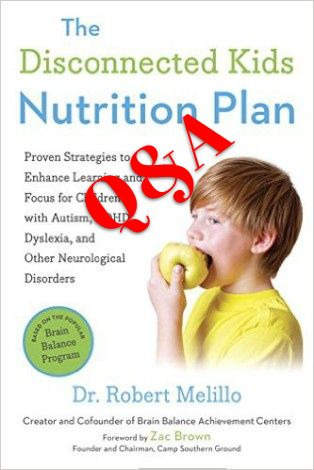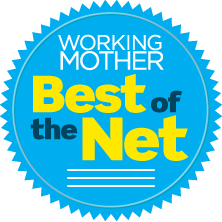I recently had an opportunity to read The Disconnected Kids Nutrition Plan: Proven Strategies to Enhance Learning and Focus for Children with Autism, ADHD, Dyslexia, and Other Neurological Disorders, a book by Author Dr. Robert Melillo. I have to say that everything I read was spot on. If you have dealt with a child that has a neurological disorder and have fought the seemingly never ending battles at the dinner table, you are looking for anything that might help. Trust me when I say, you are not alone.
In the book, disorders and underlying cause and affect are explained in a way that a normal person, like myself, can actually understand. Most everyone has heard of the conditions like Autism and ADHD, but until you have experienced the struggle, it is hard to understand what a parent is going through and how that parent can proactively help with things such as nutrition.
I had the opportunity to sit down and ask the Author, Dr. Robert Melillo, some questions about his take on kids, disorders and nutrition.
Is there a direct correlation between nutrition and behavior in children who struggle with brain imbalance? What is the relationship?
Yes, but it really depends on the level of imbalance in the brain and in the body. The brain controls all systems including the immune and digestive systems, therefore the more out of balance or dysfunctional the brain is the more out of balance and dysregulated the gut and the immune system will be. When the brain is not working optimally or if it is immature the digestive system is impacted in 3 primary ways. First there is reduced production of secretions such as digestive enzymes needed to chemically break down food especially proteins. Also we see reduced secretion of stomach acid which also affects digestion and also impacts the PH balance in the gut which allows bad bacteria and yeast to flourish, this also affects the ability to absorb B Vitamins. Second there is reduced blood flow to the gut which reduces absorption of vitamins and minerals and other nutrients. The reduced blood flow also causes a breakdown of the stomach lining which leads to what is known as a “Leaky Gut”. The stomach lining becomes more porous and allows larger undigested proteins to get through the lining into the blood system which triggers an immune inflammatory response. These inflammatory chemicals known as cytokines can trigger inflammation in the body and the brain and will affect the child’s behavior and ability to learn more than anything else. This is exacerbated by the imbalance in the brain because this imbalance causes an imbalance in the immune response which can either make the immune response weaker and the child more prone to chronic infections, like ear infections. Or it may make the immune system too strong and the child develops sensitivities to foods and chemicals in their environment. Both of these situations will affect the child’s behavior.
Can you explain how the elimination diet can help produce dramatic improvements for a child struggling with neurological disorders?
Kids are commonly picky eaters – they don’t want to try new things, stick to their favorites, etc. So how can parents determine if their kid is just picky, or has a larger underlying problem? Therefore modifying their diet can reduce this inflammation and improve behavior but ultimately the primary problem is the brain imbalance. The imbalance in the brain is what may lead to the food sensitivity and the inflammatory response. Eliminating the food eliminates the trigger but it does not address the root cause in some cases. Eliminating these inflammatory foods by itself often can result in very dramatic positive improvement in symptoms and improve behavior, learning, concentration, sleeping and emotional regulation.
What are some of the most common sensory issues a child might experience during mealtime and what are a few examples of proposed solutions?
The most common sensory issues revolve around smell and taste and tactile sensations. In almost all children with behavior and learning issues there is an abnormal, diminished or completely absent sense of smell. This diminished smell and taste means that the child will judge food by the way it looks and the way it feels in their mouth or by temperature and not by taste and smell. This is partly why they are such picky eaters and they can be very resistant to new foods. Trying to behaviorally mange this is almost impossible; you can’t “make “a child eat when their brain is telling them not to. The answer is to get their sense of smell to return to normal. We do smell activities along with other things that help stimulate their brain and improve their smell and taste. When that happens the child naturally will be open to new more varied foods. Along with that we also see improvement in social skills.
Throughout the book you provide brief stories of actual clients you’ve worked with through the Brain Balance program that showed moderate to severe sensitivities to foods. How do these sensitivities present themselves? What are some telltale signs?
Food sensitivities can be difficult to identify, they are not like food allergies where there are obvious severe physical symptoms .Food sensitivities to things like gluten or dairy primarily present with behavior .learning, emotional or sleep issues. So most parents are not aware that their child has a food sensitivity. Responses to foods in the child may also take a couple of days to come out so there isn’t this cause and effect relationship. You can’t just look at a child and know that they have a food sensitivity or know what foods they may be sensitive to. The only way to tell is to eliminate foods and then reintroduce the way I have described in my books. There are also blood tests that can help identify food sensitivities but they are not 100% accurate .That is why I believe every child with a learning or behavior issue should go through some sort of elimination diet and food challenge.
You make sure to distinguish early on that foods do not cause neurological disorders, but that dietary choices can help improve the function and health of those that suffer from neurological disorders. What are some of the probable or possible causes for these common neurological disorders like autism and ADHD?
There are many, I went through these genetic and environmental risk factors in my third book Autism The Scientific Truth… 2013. In general though there is something that causes a developmental delay in the brain during a specific stage of development that affects certain areas of the brain or one side of the brain relative to the other. This leads to a developmental imbalance in the brain where certain areas are more mature and stronger than other areas. This type of developmental imbalance is reflected in an “unevenness” of skills that can show up in academics or behavior. In most cases there is no specific, injury, pathology or genetic mutation, it is a functional imbalance that is correctable.
How did Grammy-award winning musician Zac Brown get involved with this new release? Does he have personal experiences with neurological disorders?
Zac and I first met around 2008 before he even had a record deal .He had become aware of our Brain Balance Centers in Atlanta and Zac was already developing plans for a special camp in the Atlanta area that was going to be for typical kids and kids with disabilities like Autism. When Zac was a kid although he was a typical kid without any disabilities he went to a summer camp that had typical and disabled kids in the same cabin. His summers in the camp really left a big impact on him and he dreamed of starting his own camp someday to help kids. When he heard about what we were doing, he though it sounded great and wanted to incorporate some of my ideas into the camp. He asked if I would work with him and of course I was happy to do it. Soon after we first met of course he released his first record “Chicken Fried”, the rest is history. Zac has been raising 50 million dollars to build his Camp Southern Ground and I wanted to help so I thought this book would be a good way I could help raise money for the camp and help kids and families at the same time. So all of the profit from this book will go to his camp.
Putting it simply, this book is astounding. It is overflowing with information that will help parents, and others, get the answers they have been looking for. Remarkable and well executed, I would highly recommend this book to others.

